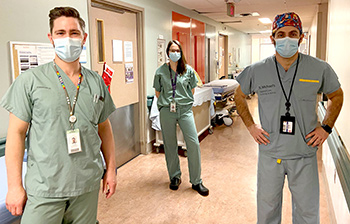Collaborative operations between St. Michael’s gastroenterology and general surgery divisions push surgical limits

By Maria Sarrouh

Drs. Jeffrey Mosko, Marisa Louridas and Tyler Chesney
Doctors in St. Michael’s gastroenterology and general surgery divisions have teamed up to adopt an innovative, minimally-invasive surgical approach developed in Japan.
The laparoscopic endoscopic cooperative surgery method, or LECS for short, helps doctors overcome the technical challenges of treating some complex cancer cases.
“We have been able to remove tumors in a minimally invasive way, leaving patients’ stomachs intact,” said Dr. Jeffrey Mosko, a gastroenterologist at St. Michael’s.
For three years, the division of gastroenterology at St. Michael’s has managed and cured early cancers by performing Endoscopic Submucosal Dissections; a procedure in which doctors remove tumors using an endoscope. This technique helps patients avoid major operations. However, some cancers – like lesions growing from deep within the stomach wall and early cancers with extreme scarring – traditionally require more invasive surgeries.
Using a LECS approach, surgeons can generally reduce how much of the stomach is removed, providing patients with the best possible outcome, Dr. Mosko explained.
“This has enhanced the quality of care we provide and has paved the way for us to provide this organ preserving procedure to other patients,” he said.
Dr. Tyler Chesney, a colorectal and gastrointestinal surgical oncologist at St. Michael’s, spent a month learning about gastric surgery including LECS in Japan. He collaborated with the gastroenterology team to bring the new technique to the hospital. To his knowledge, St. Michael’s is the only hospital in Canada that has adopted the method.
“One of the unique factors at St. Michael’s is both the surgeons and gastroenterologists have the interest and skillset to collaborate and offer this procedure to patients,” Dr. Chesney said. “Bringing different groups together like this in a cohesive way optimizes our capacity to treat patients.”
Collaboration between the cancer surgeons and gastroenterologists has led to other advancements in the quality of care for patients.
Dr. Mosko says patients have been referred to St. Michael’s from other institutions after being offered highly-invasive operations. Around one month ago, a patient came to St. Michael’s after a different hospital suggested his entire rectum be removed when he was found to have rectal cancer.
Dr. Marisa Louridas, a colorectal surgeon at St. Michael’s worked with the gastroenterologists to find a better solution. After an endoscopic ultrasound, she concluded the cancer could be removed trans-anally, a minimally-invasive technique in which the patient would keep his rectum and bowel function and be cured.
“If it wasn’t for this technology and our collaboration, the patient would have a colostomy bag forever,” said Dr. Louridas. She often works with the gastroenterologists on surgical planning to find the best surgical option to treat patients and optimize organ function.
“We’re often in each other’s rooms, helping each other make decisions,” she said.
The cancer surgeons and gastroenterology physicians now meet once a month to present overlapping topics and talk about which approaches can give patients the best outcomes. “The lens to which you look at a patient is really unidirectional if you’re doing it alone,” she continued.
The therapeutic endoscopy program at St. Michael’s hospital has a long history of innovation and will continue to break boundaries, said Dr. Mosko.
“In the coming months, we will be the first in Canada to pioneer new artificial intelligence technologies into our procedures,” he said. “So stay tuned!”
About St. Michael’s Hospital
St. Michael’s Hospital provides compassionate care to all who enter its doors. The hospital also provides outstanding medical education to future health care professionals in more than 27 academic disciplines. Critical care and trauma, heart disease, neurosurgery, diabetes, cancer care, care of the homeless and global health are among the Hospital’s recognized areas of expertise. Through the Keenan Research Centre and the Li Ka Shing International Healthcare Education Centre, which make up the Li Ka Shing Knowledge Institute, research and education at St. Michael’s Hospital are recognized and make an impact around the world. Founded in 1892, the hospital is fully affiliated with the University of Toronto.
About Unity Health Toronto
Unity Health Toronto, comprised of Providence Healthcare, St. Joseph’s Health Centre and St. Michael’s Hospital, works to advance the health of everyone in our urban communities and beyond. Our health network serves patients, residents and clients across the full spectrum of care, spanning primary care, secondary community care, tertiary and quaternary care services to post-acute through rehabilitation, palliative care and long-term care, while investing in world-class research and education. For more information, visit www.unityhealth.to.
